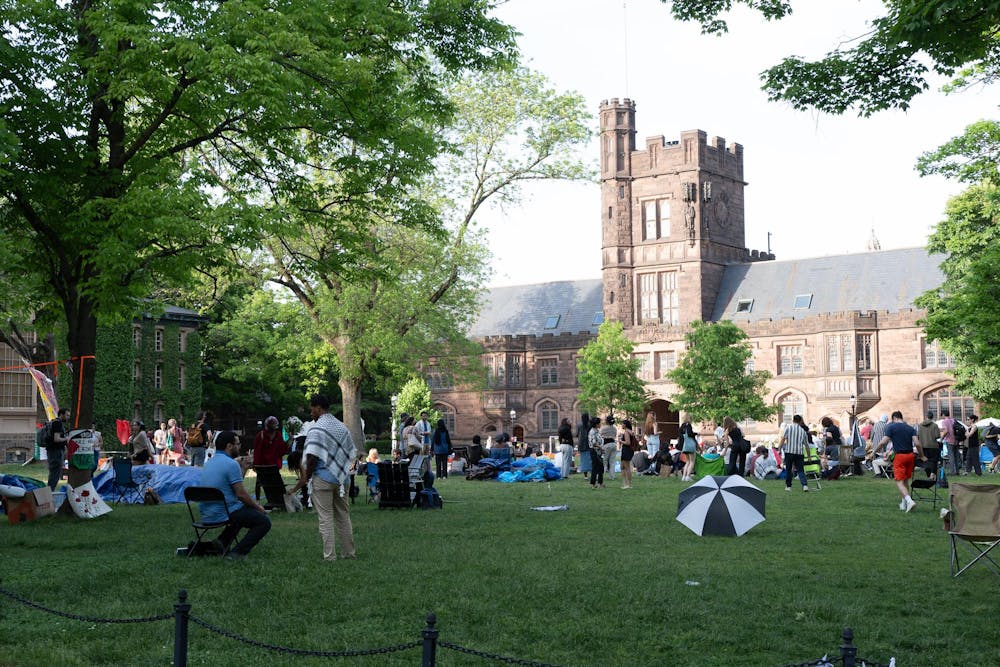In November 2023, I wrote a letter to the editor on the importance of remembering the radical side of Princeton’s activist history and the politics of how we remember campus activism. As I wrote that letter, I could never have imagined the incredible things that current Princeton student activists would achieve just six months later with the Princeton Gaza Solidarity Encampment, also known as the Popular University for Gaza. If my previous letter lamented the lost radicalism of past campus activism we needed to recall, then recall it we have. On a supposedly apolitical, apathetic campus, students occupied space in solidarity with the Palestinian people for three weeks, organized a hunger strike that lasted over a week, held rallies of over 350 people, and, most importantly, put Palestinian liberation at the center of campus discourse in an unprecedented fashion. That is something worth remembering.
The vital question we must now ask ourselves as a campus community is how will we remember this moment? As the great Palestinian literary critic Edward Said ’57 pointed out, there is a vital politics to memory, because how we remember and define our traditions of activism define who we imagine ourselves and our political horizons to be. As Said put it, “the invention of tradition is a method for using collective memory … memory is not necessarily authentic, but rather useful.” One of our moral imperatives now is to make the memory of the encampment useful, to understand what it represented and will represent for future generations of student activists. We must define a tradition that captures the encampment as it really was: rooted in hopeful, expansive visions of liberation, convicted in its radical politics, and full of solidarity.
We have already seen University administrators try to employ the politics of memory for their own ends. They have attempted to present student protesters as unsafe or as disruptive to respectful dialogue on campus. But that isn’t the reality. Faculty — themselves long-time students of traditions of protest and radical change — have made clear that sit-ins and other acts of protest in service of the Palestinian liberation movement should be remembered as part of a long tradition of activism for justice, both on this campus and beyond. These two narratives are actively competing, right now, to be the story of the Gaza Solidarity Encampment. Memory matters. And the choice between these narratives is just one small example of how the meaning of this moment in Princeton’s history is currently being contested and needs to be defined through the active work of remembrance.
At the Popular University of Gaza, we made art together and held teach-ins that welcomed community members from outside our ivory-towered walls. We shared meals and learned traditions of solidarity and struggle across different times and places. This was a radical vision of what the University, and a liberated world, could be. Now, we must grapple with its meaning.
Rather than a definitive proclamation, then, this is an invitation to myself and others to sit with our experience at the Popular University for Gaza and reflect on how we might carry our memories of that space and moment with us for the rest of our lives. We should have conversations with friends and family; we should write; we should share photographs and make art and adopt whatever other practices of memory come to mind to ensure that the real stories of the encampment are public. Here’s just one example to get us started.
On the second Friday of the encampment, over a dozen other students and I launched a hunger strike in solidarity with the Palestinian people and in protest of the University’s treatment of student activists. Our hunger strike, a deeply spiritual experience for many of us, began on a Friday, a sacred day in both Islam and Judaism. Across from the tarp where the hunger strikers sat, a tarp designated “The People’s Masjid” hosted students and community members from across New Jersey for Jummah, the Muslim communal prayer performed every Friday. Later that evening, Jewish students would hold Shabbat services on that exact same tarp while a group of Muslim students held a concurrent Qur’an recitation circle nearby.
This is a memory worth clinging to: There we were, not just fighting for a more just world, but actively constructing it. In moments like these, we created interfaith solidarity, as well as solidarity between students and surrounding communities that far exceed anything accomplished by any formal University initiative ostensibly aimed at these goals.
Before the Popular University for Gaza, I sincerely doubt any outdoor green space on campus, let alone Princeton’s main green, had been used for such a beautiful display of community and solidarity. On that tarp, on that day, we were not just abstractly talking about community-engaged scholarship, but actively shattering the illusion of the Orange Bubble, bringing students and communities of all backgrounds together to prove that Princeton students were anything but unconcerned with the world around them.

This is the story of the Princeton encampment: Princeton students hunger striking; Princeton students proudly practicing their faith as a form of resistance; Princeton students praying side by side; Princeton students inviting their community to eat with them, day after day. It’s the story of Princeton students deeply invested in constructing worlds much better than those offered up by the University, a story that was almost unimaginable before. But these things happened at the Popular University for Gaza. And by relentlessly remembering them, we give ourselves permission to imagine a world other than the one given to us.
David Chmielewski is a recent graduate from Princeton’s Class of 2024. He concentrated in English, focusing on decolonial theory and critical thought.









